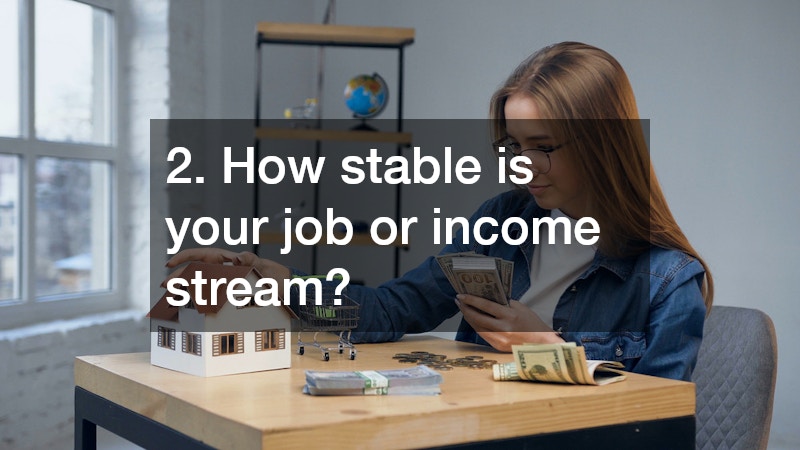
Buying a house is more than just a financial decision—it’s a life-changing commitment. While many focus on market trends, mortgage rates, or location, personal factors often carry equal or even greater weight in ensuring long-term satisfaction. Your lifestyle, values, goals, and financial habits can all influence whether a home is truly right for you. If you’re a homebuyer preparing to make this major investment, ask yourself these essential questions to make sure you’re ready—mentally, emotionally, and practically.
Let’s break down the personal considerations that can make or break your homeownership journey.
1. What is your current financial situation, and are you ready for the commitment?
Before jumping into the homebuying process, you need a clear and honest view of your finances. Homeownership comes with upfront costs like down payments and closing fees, as well as long-term responsibilities such as mortgage payments, taxes, and maintenance.
Ask yourself:
- Do I have enough saved for a down payment (typically 10%–20%)?
- Do I have an emergency fund that covers at least 3–6 months of expenses?
- Am I comfortable with taking on a mortgage for 15–30 years?
Also consider your credit score, debt-to-income ratio, and job stability. Lenders will assess these too, but you should be the first to evaluate whether you’re truly prepared for the financial responsibility of owning a home.
2. How stable is your job or income stream?

Financial readiness goes beyond what’s in your bank account. Long-term job security and a reliable income are crucial, especially if you’re taking on a 30-year mortgage.
- Have you been employed in your field or company for more than 2 years?
- Is your job or industry stable in the current economic climate?
- Do you foresee any upcoming changes in your income, like starting a business or switching careers?
If your income is irregular or fluctuates—common for freelancers or commission-based workers—be extra cautious about your budget and consider speaking with a financial advisor or mortgage broker familiar with non-traditional incomes.
3. What are your long-term lifestyle goals?
Many buyers fall into the trap of buying a home that fits their present but not their future. To avoid buyer’s remorse, think five to ten years ahead.
Ask yourself:
- Do I plan to get married or have children?
- Will I need to care for aging parents?
- Am I considering a career change that could involve relocation?
Choosing a home aligned with your long-term goals can help you avoid costly moves and make the most of your investment.
4. What are your daily routines, and how will they be affected?
Your lifestyle plays a big role in whether a house will truly feel like home. Think about how you spend your time and whether a potential home supports or hinders those routines.
For example:
- Do you value walkability to cafes, gyms, or parks?
- Is a long commute to work or school acceptable?
- Do you work from home and need a dedicated office space?
Consider how a home’s layout, neighborhood, and amenities fit into your daily life.
5. How much space do you really need?
When you’re house hunting, it’s easy to get swept up by grand spaces and dream layouts. But too much space can mean higher costs in utilities, upkeep, and taxes.
Ask:
- Do I need extra bedrooms now, or just plan to in the future?
- How much entertaining or hosting do I actually do?
- Is a big backyard something I’ll use or just end up maintaining?
Assessing your current and near-future needs can help you avoid buying more house than necessary, saving you money and stress.
6. What are the personal factors that you should consider before buying a house?
This is the heart of the matter—understanding how your personal life impacts your housing needs. Beyond finances and career plans, dig into emotional readiness and personal values.
Key personal factors to evaluate:
- Emotional stability – Are you making this decision out of pressure, fear, or excitement?
- Lifestyle fit – Does the home support hobbies, family life, or retirement plans?
- Support systems – Are you close enough to friends, family, or your social circle?
- Health and mobility – Is the home suitable for aging in place or accommodating health needs?
These individual considerations often get overlooked in favor of numbers and features, but they’re just as critical to your long-term happiness.
7. Are you prepared for ongoing maintenance and unexpected repairs?
One of the biggest shocks for first-time homeowners is the cost and responsibility of maintenance. From HVAC repairs to roof replacements, the bills—and the stress—can add up quickly.
Before buying:
- Research typical maintenance costs for homes in your area (about 1%–2% of the home’s value annually).
- Ask the seller for maintenance records or recent upgrades.
- Consider a home inspection and budget for upcoming repairs.
If the idea of fixing a leaking roof or shoveling snow doesn’t appeal to you, a condo or newer home with low maintenance requirements might be a better fit.
8. Do you understand the trade-offs between renting and owning?
Owning a home comes with many benefits—equity, customization, and stability—but it’s not always the better choice.
Ask:
- Would I be better off renting while I save or waiting for better market conditions?
- Am I willing to give up flexibility in exchange for stability?
- Will homeownership improve my quality of life or add more stress?
Understanding your current priorities can help you determine if now is the right time to buy—or if waiting could serve you better.
9. What kind of neighborhood will best support your lifestyle and needs?

The house may be perfect, but what about the community around it? Your neighborhood can greatly affect your experience, from daily convenience to long-term resale value.
Consider:
- School districts (even if you don’t have kids—this impacts property value)
- Crime rates and safety
- Access to transportation, shopping, healthcare, and recreation
- Future development plans or zoning changes
Spend time in the neighborhood at different times of day. Talk to locals, visit nearby stores, and assess traffic patterns to get a full picture.
10. Are you emotionally ready to become a homeowner?
Finally, this is a deeply personal question that only you can answer.
Buying a house is a commitment that involves stress, sacrifice, and long-term responsibility. Are you ready for:
- Delayed gratification (fewer vacations, big-ticket purchases)?
- Giving up flexibility in exchange for long-term investment?
- The responsibility of making large decisions and solving problems yourself?
If you’re buying because you “feel like you should” or are being pressured by others, take a step back. Homeownership is a serious commitment, and the best decisions are made with clarity and confidence, not haste or obligation.
11. Is your relationship situation aligned with this decision?
Buying a house as a couple or with a partner is a major milestone, but it also comes with emotional and legal implications. Before signing a mortgage together, evaluate whether your relationship is ready for such a long-term financial commitment.
Ask yourself:
- Are we both financially stable and contributing equally or fairly?
- Have we discussed how the home will be titled or who’s responsible for what?
- What happens if we split up or relocate due to career changes?
Homeownership can place strain on even the strongest partnerships if roles, expectations, and future plans aren’t aligned. If you’re single, think about whether you’re buying with the expectation of soon partnering up, and how that might impact your home choice. Having a clear, realistic conversation—possibly with a legal advisor—can prevent regrets and legal headaches down the road.
12. Have you compared different types of housing options?
Many homebuyers go straight to looking at single-family homes without exploring other viable housing options that might better suit their needs. Depending on your lifestyle, finances, and goals, other choices, such as townhouses, condos, or multi-family units, might offer more benefits.
Here are a few things to consider:
- Condos often have lower maintenance but come with HOA fees and shared amenities.
- Townhouses provide a balance between apartment living and detached homes.
- Multi-family homes can generate rental income, but also require management responsibilities.
Ask yourself: How involved do I want to be in maintenance? Would shared amenities enhance or hinder my lifestyle? Do I want rental income to help with the mortgage?
Your ideal home doesn’t have to fit the traditional mold—exploring all available options can help you find the perfect match.
13. Are you mentally prepared for the homebuying process itself?
Beyond affording the home and envisioning your future in it, you also need to be mentally ready for the buying process, which can be lengthy, complex, and emotionally draining.
During the process, you’ll face:
- Competitive bidding wars
- Negotiations and counteroffers
- Home inspections and appraisals
- Reams of paperwork and deadlines
It’s easy to feel overwhelmed or pressured to make snap decisions. Mental preparedness means being patient, doing your research, and having a trusted team, like a knowledgeable real estate agent, a lender you trust, and possibly a real estate attorney.
Set realistic expectations and remind yourself that finding the right home may take time. Emotional resilience is just as important as financial readiness when it comes to closing on a property you’ll love for years to come.
Final Thoughts: Choose the Right Home for You
While market trends and mortgage rates will always be part of the equation, the most important aspects of buying a home often come from within. Your personal situation, goals, and values should take center stage when making this life-altering decision.
By asking yourself these key questions, you not only empower yourself with clarity but also lay the foundation for a successful, fulfilling experience as a homeowner.
Remember, a house isn’t just an investment—it’s where your life happens. Make sure it’s one that fits who you are, not just where you want to be.